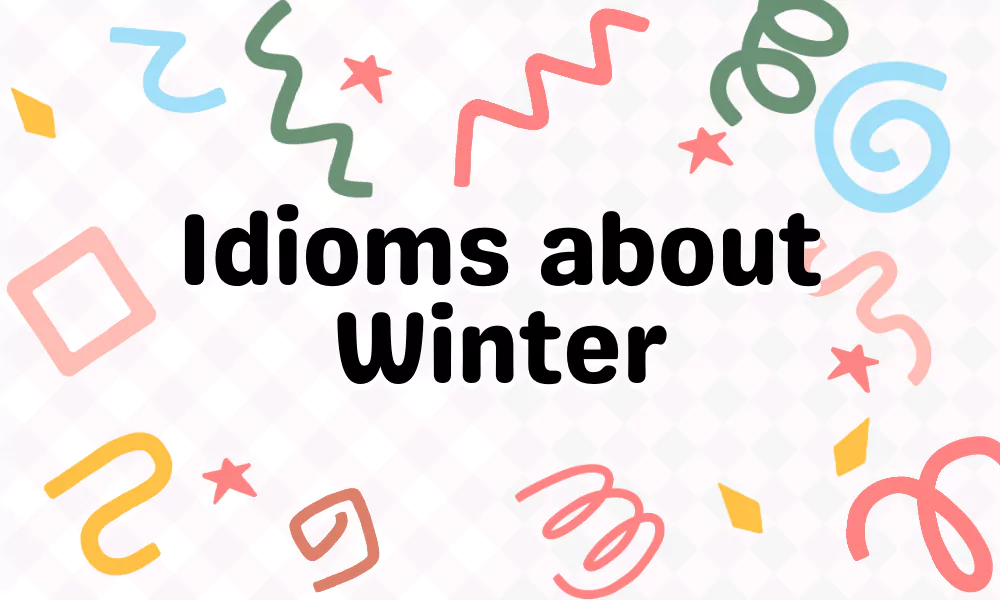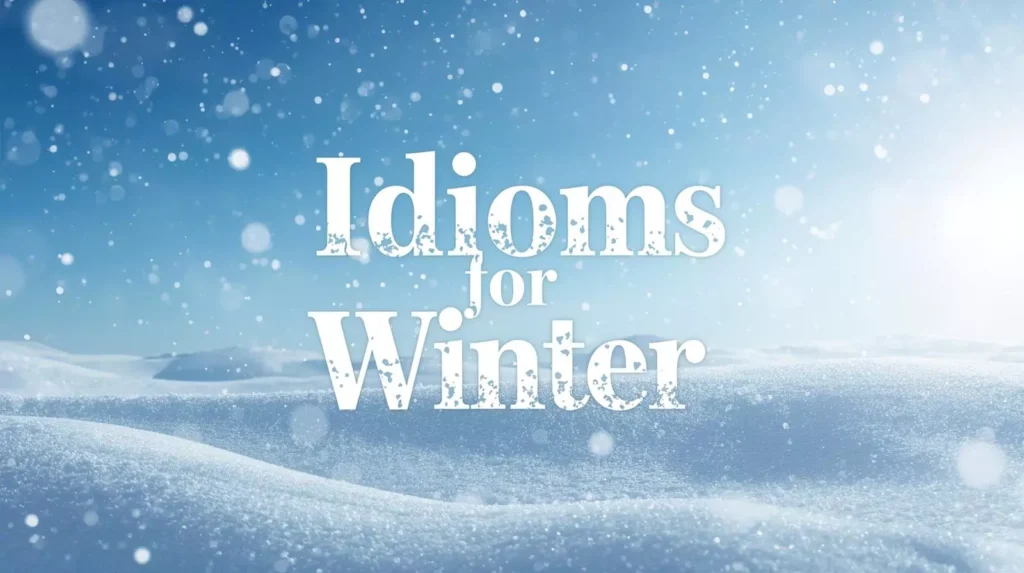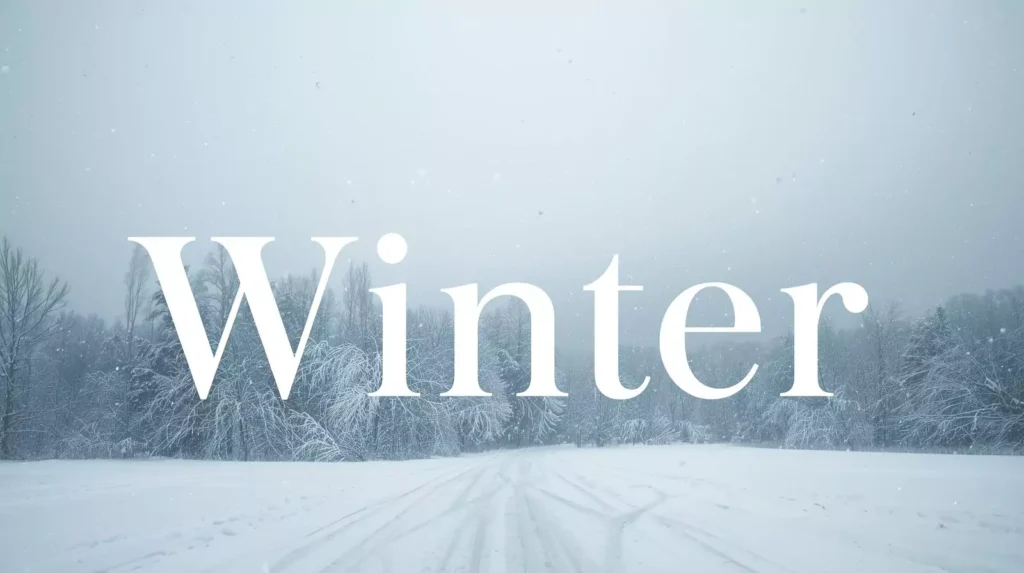Idioms for Winter – Common & Rare Winter Expressions Explained

Winter, with its frosty air, falling snow, and serene landscapes, doesn’t just transform the world around us but it also shapes the way we speak. From “snowball effect” to “a cold snap,” these phrases add color, depth, and cultural richness to our everyday conversations. Writers and poets, too, have long drawn inspiration from the beauty and harshness of winter, weaving its imagery into their works. Whether it’s Robert Frost finding joy in a “dust of snow” or Lewis Carroll imagining snow tucking the earth into a white quilt, winter expressions remind us that language, like the season, can be both harsh and beautiful.
What Are Idioms For Winter?
Idioms for winter are expressions that use the imagery of cold weather, snow, or the season itself to convey meanings beyond their literal words. They don’t just describe winter conditions, they often reflect emotions, situations, or human behavior. Similarly, the “snowball effect” refers to something that grows rapidly, much like a rolling snowball picking up more snow. These idioms connect language with seasonal experiences, making conversations more vivid, relatable, and culturally rich.

Commonly Used Idioms For Winter
- Cold shoulder – To ignore someone deliberately.
Example: She gave him the cold shoulder after their argument. - Snowball effect – Something that grows rapidly in size or importance.
Example: His small mistake created a snowball effect, leading to bigger problems. - In the dead of winter – The coldest and darkest part of winter.
Example: We traveled through the mountains in the dead of winter. - Break the ice – To start a conversation in an awkward situation.
Example: The teacher told a joke to break the ice on the first day. - Frosty reception – An unfriendly or cold welcome.
Example: His idea received a frosty reception at the meeting. - Cold as ice – Completely unemotional.
Example: Her expression was cold as ice during the interview. - Snowed under – Overwhelmed with too much work.
Example: I’m snowed under with assignments this week. - Put something on ice – To delay or postpone.
Example: They put the project on ice until next year. - Tip of the iceberg – A small visible part of a much bigger problem.
Example: The missing files were just the tip of the iceberg. - Left out in the cold – Ignored or excluded.
Example: He felt left out in the cold when no one asked his opinion. - Pure as the driven snow – Innocent or virtuous.
Example: She pretended to be pure as the driven snow. - Snow job – A deception or exaggeration.
Example: The salesman gave us a snow job about the car’s condition. - On thin ice – In a risky or dangerous situation.
Example: He’s on thin ice after missing two deadlines. - The cold hard truth – Harsh reality.
Example: The cold hard truth is that the company is failing. - Snowball’s chance in hell – No chance at all.
Example: He has a snowball’s chance in hell of winning the lottery. - Winter blues – Sadness or depression during winter.
Example: She always gets the winter blues when the days are short. - Cold feet – Sudden fear before an important event.
Example: He got cold feet before the wedding. - Blanket of snow – A thick covering of snow.
Example: The town was covered under a blanket of snow. - As snug as a bug in a rug – Warm and comfortable.
Example: The kids were as snug as a bug in a rug by the fire. - Snowed in – Trapped indoors by heavy snow.
Example: We were snowed in for two days during the storm. - A cold snap – A sudden period of freezing weather.
Example: The crops were damaged during the cold snap. - When hell freezes over – Something that will never happen.
Example: He’ll apologize when hell freezes over. - Cold turkey – To quit something suddenly.
Example: He gave up smoking cold turkey. - As white as snow – Very pale.
Example: Her face went as white as snow when she heard the news. - Out cold – Unconscious or deeply asleep.
Example: He was out cold after the surgery. - Snow angel – A figure made in the snow by lying down and moving arms/legs.
Example: The children made snow angels in the yard. - Freeze up – To be unable to act or speak.
Example: He froze up during the presentation. - Cold comfort – A small consolation in a bad situation.
Example: The apology was cold comfort after the damage was done. - Snowed out – When an event is canceled due to snow.
Example: The concert was snowed out because of the storm. - Chill out – To relax or calm down.
Example: You need to chill out and stop worrying. - Cold-blooded – Cruel or emotionless.
Example: The cold-blooded killer showed no remorse. - Ice in one’s veins – Calm and fearless under pressure.
Example: The goalie had ice in his veins during the penalty shot. - Cold as stone – Showing no emotion or warmth.
Example: His heart seemed cold as stone. - The Big Chill – A period of extreme cold.
Example: We experienced the Big Chill last December. - Cold comfort friend – Someone who tries to console but makes things worse.
Example: His words made him a cold comfort friend. - Snowbound – Trapped or stuck by heavy snow.
Example: The hikers were snowbound in the cabin. - Walking on thin ice – Taking dangerous risks.
Example: She’s walking on thin ice with her boss. - Frozen in time – Unchanged, preserved.
Example: The old village looked frozen in time. - Cold war – Tense but indirect conflict.
Example: The siblings were in a cold war for weeks. - Cold day in July – Something very unlikely to happen.
Example: It’ll be a cold day in July when he arrives on time. - As cold as January – Extremely cold.
Example: The wind was as cold as January. - Snowflake – A fragile or overly sensitive person.
Example: He’s such a snowflake when criticized. - To break out in a cold sweat – To suddenly feel anxious or fearful.
Example: She broke out in a cold sweat before the exam. - Cold fish – Someone unemotional and distant.
Example: He’s such a cold fish at parties. - Put on ice skates – To prepare quickly for action.
Example: We had to put on ice skates to meet the deadline. - Snowblind – Overwhelmed or dazzled by appearances.
Example: Don’t get snowblind by her charm. - Like snow off a dyke – Something disappearing quickly.
Example: The money went like snow off a dyke. - Cold wave – A sudden outbreak of cold weather.
Example: The cold wave hit the entire region. - Icebreaker – An activity to ease tension.
Example: The game was a fun icebreaker at the meeting. - As cold as winter – Emotionally distant.
Example: His tone was as cold as winter itself.
Rare and Unique Idioms For Winter
- Jack Frost nipping at your nose – The feeling of winter cold.
Example: Jack Frost nipped at our noses during the walk. - Castles in the snow – Unrealistic dreams or fantasies.
Example: His business ideas are just castles in the snow. - Snowflakes on the tongue – Enjoying small, fleeting pleasures.
Example: Childhood is like catching snowflakes on the tongue. - A snowball in summer – Something impossible.
Example: He has a snowball in summer chance of succeeding. - Icicles in the heart – Emotional coldness or heartbreak.
Example: Her cruel words left icicles in his heart. - Frozen stiff – Completely frozen from cold.
Example: We were frozen stiff waiting for the bus. - Snow pillow – A soft, deceptive comfort.
Example: His promises were like resting on a snow pillow. - Winter of discontent – A period of unhappiness.
Example: The layoffs led to a winter of discontent among workers. - Like snow in harvest – Something rare or out of place.
Example: Kindness from him is like snow in harvest. - Snow mask – Hiding true emotions behind coldness.
Example: He wore a snow mask to conceal his grief.
Winter Idioms in Literature and Pop Culture
- “Now is the winter of our discontent” (Shakespeare, Richard III) – A time of unhappiness or trouble.
Example: Political unrest created a winter of our discontent. - “A dust of snow” (Robert Frost) – A small thing that changes mood or outlook.
Example: Her smile was like a dust of snow that lifted his spirits. - “Winter is coming” (Game of Thrones) – A warning of danger ahead.
Example: With exams approaching, it feels like winter is coming. - “The winter of our lives” – Old age or the later stage of life.
Example: They found happiness even in the winter of their lives. - “Winter wonderland” (Song/Pop culture) – A beautiful snowy landscape.
Example: The town turned into a winter wonderland overnight. - “The big freeze” (Media phrase) – A period of extreme cold or crisis.
Example: The country faced an economic big freeze. - “Frozen heart” (Disney’s Frozen) – Emotional coldness or detachment.
Example: His frozen heart softened after meeting her. - “Snow Queen” (Hans Christian Andersen) – A symbol of icy power or cold beauty. Example: She ruled the office like a Snow Queen.
- “Cold as a witch’s kiss” (Folklore) – Extremely cold.
Example: The night was cold as a witch’s kiss. - “Chill out, man” (Pop slang) – Relax or calm down.
Example: Chill out, man, everything will be fine.

Synonyms and Alternatives about Winter
| Synonym | Meaning |
|---|---|
| The Cold Season | A simple term for the time of year with freezing weather. |
| The Frosty Season | A descriptive alternative highlighting frost. |
| The Bleak Season | A literary synonym often linked with harshness. |
| The Dark Season | Emphasizes shorter days and longer nights. |
| Yuletide | Old-fashioned word linked to Christmas season. |
| Jack Frost’s Reign | Poetic phrase personifying winter. |
| The Icy Quarter | Refers to the three months of winter. |
| The Sleeping Season | Reflects how nature rests in winter. |
| The Snowy Months | Everyday descriptive phrase. |
| The Wintertide | An archaic or poetic synonym. |
Unique Tips for Using Winter Idioms in Writing and Speech
- Match Idioms to Mood – Use uplifting idioms like “winter wonderland” for positive tones, and heavier ones like “dead of winter” for somber moods.
- Use Sparingly – A sprinkle of idioms makes writing lively, but overuse can feel forced. Think of idioms as seasoning, not the main dish.
- Blend with Imagery – Combine idioms with descriptive language. For example: “In the dead of winter, the city slept under a thick blanket of snow.”
- Adapt to Audience – Choose familiar idioms (“break the ice”) for casual speech, but more poetic ones (“winter of discontent”) in literature or formal writing.
- Create Contrast – Winter idioms can add drama when contrasted with warmth. Example: “Her frosty reception melted into kindness by the end of the evening.”
Read More: Idioms for Weird
Read More: Idioms for Basketball
FAQs
Conclusion
Winter has always inspired language with its icy beauty, quiet stillness, and sharp chill. From everyday sayings like “cold shoulder” and “break the ice” to poetic expressions such as “winter of discontent,” these idioms capture more than just the season. Whether you’re writing creatively, speaking casually, or teaching English, winter idioms add richness, imagery, and depth to communication. By learning their meanings and examples, you not only improve your vocabulary but also discover how language mirrors the moods of the coldest season.
